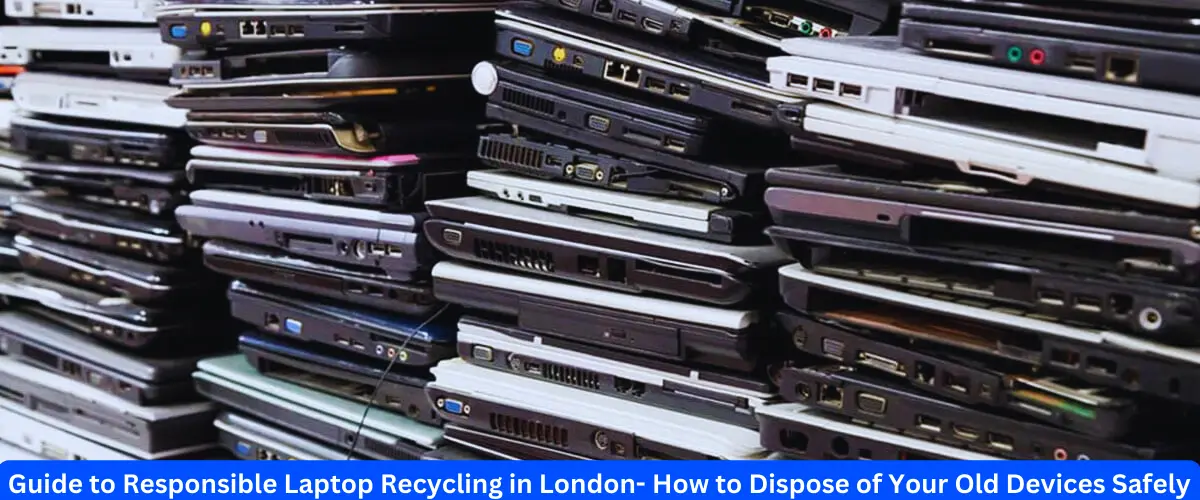In today’s digital age, electronic waste (e-waste) has become a significant environmental concern, and responsibly recycling old laptops is crucial to minimizing its impact. In this comprehensive guide, we’ll explore the steps you can take to dispose of your old laptops safely and responsibly in London, ensuring that they are recycled in an environmentally friendly manner.
Understanding the Importance of Responsible Laptop Recycling
Environmental Impact of E-Waste
Laptops contain various hazardous materials, including heavy metals and toxic chemicals, which can leach into the environment if not disposed of properly. Recycling old laptops helps prevent these harmful substances from contaminating soil, water, and air, reducing environmental pollution and protecting ecosystems.
Resource Conservation
Laptops also contain valuable materials such as metals, plastics, and glass, which can be recovered and reused in the manufacturing of new products. Recycling old laptops conserves natural resources, reduces energy consumption, and minimizes the need for raw materials extraction, contributing to a more sustainable and circular economy.
Data Security
Properly disposing of old laptops is essential for protecting sensitive information stored on the devices. Simply deleting files or formatting the hard drive may not be enough to prevent data breaches. Responsible and secure laptop recycling services involves securely erasing all data from the device to ensure that it cannot be accessed by unauthorized individuals.
Step-by-Step Guide to Responsible Laptop Recycling in London
1. Backup Your Data
Before recycling your old laptop, it’s essential to back up any important data stored on the device, such as documents, photos, and files. Transfer the data to an external storage device or cloud service to ensure that it is safely preserved and accessible after recycling.
2. Erase Your Data Securely
Once you’ve backed up your data, it’s time to securely erase it from the laptop’s hard drive to prevent unauthorized access. Use data wiping software or tools that overwrite the entire drive with random data multiple times, making it virtually impossible to recover the original information.
3. Remove Personal Accessories
Before recycling your laptop, remove any personal accessories or peripherals attached to the device, such as chargers, cables, and external drives. These items can often be reused or recycled separately, so it’s essential to separate them from the laptop before recycling.
4. Find a Certified Recycling Facility
Next, research certified recycling facilities in London that specialize in e-waste recycling. Look for facilities that have been accredited by recognized organizations such as the Environmental Agency or the Waste Electrical and Electronic Equipment (WEEE) Directive. These facilities adhere to strict environmental and ethical standards for e-waste management.
5. Check for Collection Points
Many local councils and recycling centers in London offer collection points or drop-off locations for electronic waste, including old laptops. Check with your local council or visit their website to find out if there are any designated collection points in your area where you can drop off your old laptop for recycling.
6. Arrange for Pickup
If you’re unable to drop off your old laptop at a collection point, some recycling facilities offer pickup services for electronic waste. Contact the IT recycling UK facility or visit their website to inquire about pickup options and schedule a convenient time for them to collect your old laptop for recycling.
7. Obtain a Certificate of Recycling
After recycling your old laptop, request a certificate of recycling from the recycling facility as proof that the device has been disposed of responsibly. Keep this documentation for your records, especially if you need to demonstrate compliance with data protection regulations or environmental standards.
Additional Tips for Responsible Laptop Recycling
Donate Your Old Laptop
If your old laptop is still in working condition, consider donating it to charity or a non-profit organization that refurbishes and redistributes electronic devices to underserved communities. Donating your old laptop is a great way to extend its lifespan and provide access to technology for those in need.
Recycle Broken or Unusable Laptops
Even if your old laptop is no longer functional or has sustained damage, it can still be recycled for its valuable materials. Many recycling facilities in London accept broken or unusable laptops for recycling, so don’t hesitate to recycle your old laptop, even if it’s not in working condition.
Support E-Waste Awareness Campaigns
Get involved in e-waste awareness campaigns and initiatives in your community to raise awareness about the importance of responsible laptop recycling. Share information about proper recycling practices with friends, family, and colleagues, and encourage them to recycle their old laptops and electronic devices responsibly.
Conclusion
Responsible laptop recycling is essential for protecting the environment, conserving resources, and safeguarding sensitive information. By following the steps outlined in this guide, you can ensure that your old laptops are disposed of safely and responsibly in London, minimizing their impact on the environment and supporting sustainable e-waste management practices.
Remember to backup your data, erase it securely, remove personal accessories, find a certified recycling facility, check for collection points or arrange for pickup, and obtain a certificate of recycling. By taking these steps and exploring additional options for responsible laptop recycling, you can contribute to a cleaner, greener future for London and beyond.

